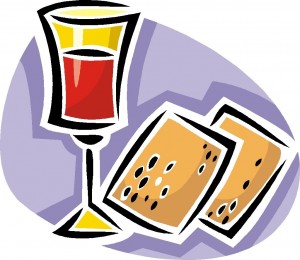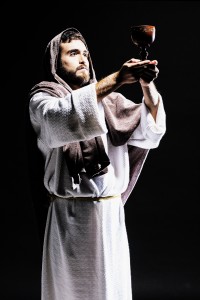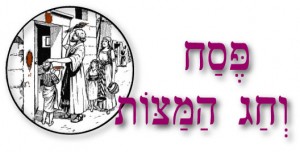Tag Archives: Communion
Are you a spiritual “cannibal?”
John 6:54, Flesh…blood. This is a Hebrew idiom for “the whole person” (see Matt 16:17; 1 Cor 15:50; Gal 1:6; Eph 6:12; Heb 2:14). This relates to Moses’ instructions that “man shall not live by bread alone…but by every word that proceeds from the mouth of YHVH” (Deut 8:3).
This applies to Yeshua who was that Word of Elohim who “became flesh and dwelt among us” (John 1:1 and 14). When one puts their faith in Yeshua (John 6:29 and 5:24), then one must also believe him—that is, not only accept him as the Son of Elohim and one’s Savior, but also follow and obey (or “eat”) him who is the Living Manna-Word of Elohim from heaven.
This involves believing his words by loving him and keeping his Torah-commands (John 14:15, 23 cp. Exod 20:6), which are his literal words. This is why YHVH instructed the Israelites to eat the whole Passover lamb, and to leave nothing left over (Exod 12:10).
This teaches us that we are to “eat” all of Yeshua—his whole Person as represented by the bread and the wine at communion on Passover. We are to accept the totality of his Word, not just the parts that suit us, or fit with our conventional religious viewpoints as per the traditions of men.
Many claim to eat all of his flesh and drink all of his blood, yet through their anti-Torah theologies they rip pages out of their Bibles and toss them into the spiritual trash can claiming it is for the Jews and not for them.
This is exactly what Adam and Eve did when they listened to the serpent’s lies at the tree of knowledge and rebelled against YHVH’s clear commands. The Bible defines sin as violating the words, commands or Torah of Elohim (1 John 3:4). It is also a sin not to believe in Yeshua (John 16:9; 3:18–19) who is the Living Torah-Word of Elohim incarnate. It is also sin to act in unrighteousness (1 John 5:17). The Bible defines unrighteousness as violating YHVH’s Torah commands (Ps 119:172), which are the words of Yeshua. In summary, when we accept all of Yeshua by eating his flesh and drinking his blood, (i.e., partaking of the bread and wine at communion) we are confessing that we accept the totality of who he was and is.
If we fail to believe and obey all of his words, then to the degree that we do so we are walking in sin, don’t love him and don’t even know him (1 John 2:3–4).
What is the “cup of salvation?”
Psalms 116:13, Cup of Salvation [Yeshua]. This is the only place this phrase occurs in the Scriptures, and it’s prophetic significance should not to be overlooked.
The Hebrew word cup [kos] often relates to Elohim’s judgment as he pours out his wrath upon rebellious people (e.g. Jer 25:15). Yeshua encountered this cup at Gethsemane (Matt 26:39).
There is also a cup of blessing, which men can drink from if they choose to do so. This is the cup of YHVH’s blessing and forgiveness through Yeshua that he offers to men. This is the subject of this passage. Interestingly, the third cup of the Passover seder is called the cup of redemption (or salvation). This is the communion cup that Yeshua offered his disciples at the last supper. It was this cup that represented the blood of the Savior and that was taken along with the unleavened bread representing Yeshua’s body. This same cup of salvation pictures the saint’s blessed relationship with Yeshua, and is a picture of the new covenant, which, in reality, is the saint’s entering into a state of marriage betrothal to Yeshua their heavenly Bridegroom.
Communion and the Power to Live a Torah-Obedient Life
1 Corinthians 11:23, This is my body. We are sanctified through the offering of the body of Yeshua (Heb 10:10).When we eat the bread of communion, we are “eating” Yeshua who is the incarnate and Living Torah Word of Elohim (John 1:14). We are announcing that Yeshua is the spiritual bread of life from heaven that leads to eternal life (John 6:48–51), and we are announcing our desire to live by the totality of his Word (Matt 4:4).
The bread symbolizing the body of Yeshua was unleavened, which is a picture of Yeshua’s sinless life. By eating this bread, we declare our faith in his sinless life by which he was able to pay for our sins. We also declare our identification with his sinlessness as an example for us to follow.
Yeshua took the unleavened bread and broke it signifying our deliverance from our sin nature by the breaking or death of his sinless body. The unleavened bread broken during the Passover meal speaks of our deliverance from the power of sin by the death of our old man. The rite of baptism is a picture of this (Rom 6:4–13). This paves the way for us to live a sanctified (sin-free) life.
We become unleavened or sinless (known as sanctification) because Yeshua our Passover Lamb was sacrificed for us (1 Cor 5:7). Our body of sin died with Yeshua when we were baptized making us unleavened (or sanctified, Rom 6:6). Let us therefore live in accordance with the new man, or new spiritual creation we have become through Yeshua (1 Cor 5:8; 2 Cor 5:17; Gal 2:20). When we eat the unleavened bread at the communion part of the Passover service, we remember that we are sanctified by grace and that the power of sin(or Torahlessness, see 1 John 3:4 cp. John 14:15) has been broken in our lives.
In the first Passover, the children of Israel were delivered from the penalty of their sins by the blood of the lamb on the door. But when they ate the unleavened bread, this speaks of their being delivered from their slavery to sin and oppression in Egypt. They were now to leave Egypt (a spiritual picture of the old man and life) and go toward the Promised Land (a spiritual picture of the new man) taking with them, on their knees, the dough of the unleavened bread. This illustrates the fact that they were to walk in the newness of a spiritually unleavened or sanctified life. When we eat the bread of communion, we memorialize the events surrounding the Exodus, and recognize the present reality of freedom from sin in our own lives.
1 Corinthians 11:25, My blood. By the blood of Yeshua we are redeemed, liberated or released from the bondage of sin (Matt 26:28; Rom 3:25; Eph 1:17; Col 1:14; Heb 9:22; 1 Pet 1:18; Rev 5:9) and from sin’s death penalty claim on us (Rom 6:23; Ezek 18:4) brought on by our disobedience to YHVH’s instructions in righteousness, the Torah (which defines sin, 1 John 3:4). His blood also sanctifies (or separates, Heb 9:13–14; 13:12) us from past sin (Rom 3:25) or Torahlessness allowing us to become a new spiritual creation before YHVH (2 Cor 5:17; Gal 2:20) in order to become a pure and special people who are zealous for good works (Tit 23:14), who will serve YHVH in righteousness, which is the good works of the Torah (Ps 119:172).
Video: Why Celebrate Passover? The Seder Explained
This video explains the relevance of the ancient Passover ritual to the redeemed believer in Yesua of the the 21st century, and why celebrating Passover brings a special blessing. A free downloadable study guide for this video is available at http://hoshanarabbah.org/blog/2013/03/12/the-passover-and-the-seder/.
When do we celebrate Passover?
Passover is just around the corner — in fact, on Saturday, April 4. We’ll be starting our Passover seder at about 6 PM on Saturday.
There is some confusion about when to celebrate the Passover, which is why I wrote the following short article. Natan
Passover occurs on the fourteenth day of the first month at twilight (Lev 23:5; Num 9:3, 5, 11). Twilight is the Hebrew word erev meaning “evening, night, sunset” according to all the main Hebrew lexicons. The root word for erev is arab meaning “to become evening, grow dark or to spend the evening, do at evening.”
Which twilight time did the Israelites keep Passover? The twilight of the thirteenth day going into the fourteenth day, or the twilight of the fourteenth day going into the fifteenth day? Let’s examine the Scriptures for the answer.
YHVH commanded the Israelites to kill the Passover lamb at twilight (Exod 12:6) and then to put its blood on their doorposts (Exod 12:7). After that, they were to roast and eat the lamb in that same evening (Exod 12:8). The word evening in Hebrew is layil meaning “night as opposed to day.” They were to eat the lamb that evening “with a belt on your waist, your sandals on your feet, and your staff in your hand…in haste” (Exod 12:11). This was the same night that Elohim struck all the firstborn of Egypt, but passed over all the houses of the Israelites that had blood on the doorposts (Exod 12:12–14).
One thing is certain. Passover occurs on the fourteenth day of the first month of the Continue reading





